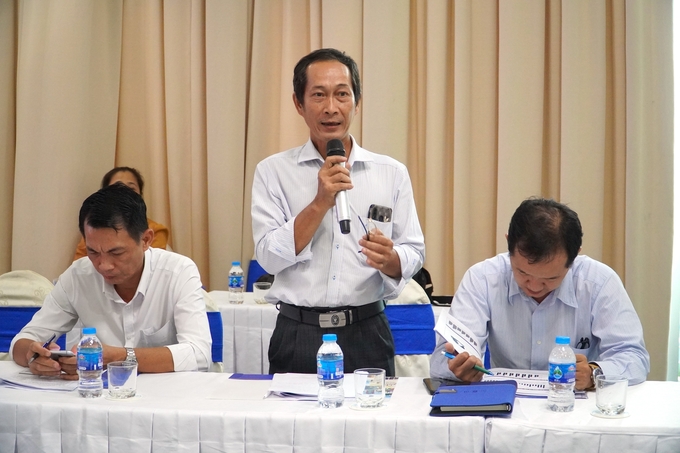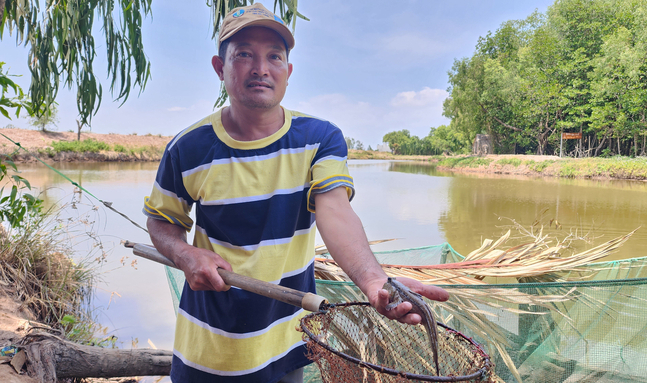November 27, 2025 | 22:41 GMT +7
November 27, 2025 | 22:41 GMT +7
Hotline: 0913.378.918
November 27, 2025 | 22:41 GMT +7
Hotline: 0913.378.918
An investigation and analysis of rural household livelihoods in the Mekong Delta was conducted to assess the current employment status, income, migration, and risks of Delta residents facing the challenge of climate change).
This activity is within the framework of the Technical Support Project for the Mekong Delta Integrated Climate Resilience and Sustainable Livelihoods Loan Project (the GEF-ICRSL Project) with non-refundable capital from the Global Environment Fund (GEF). The Central Management Board of Irrigation Projects implements the project.

Representatives of some localities in the Mekong Delta commented on the draft report investigating and analyzing the livelihoods of rural households in the Mekong Delta. Photo: Kim Anh.
The project is implemented in Hanoi and the Mekong Delta, focusing on three regions vulnerable to the impacts of climate change, including upstream provinces (An Giang, Dong Thap); coastal estuary areas (Ben Tre, Tra Vinh, Vinh Long, Soc Trang) and peninsular areas (Ca Mau, Bac Lieu, Kien Giang).
The contents of the GEF-ICRSL project are designed in conjunction with the Integrated Climate Resilience and Sustainable Livelihoods Loan Project (ICRSL) goals for the Mekong Delta. The project focuses on improving research and innovation capacity for research units to build and apply smart natural resource management, agriculture, forestry, and fishery practices to adapt to climate change in selected provinces in the Mekong Delta region to improve the efficiency of the ICRSL project.
Mr. Nguyen Khai Hoan, Deputy Director of the GEF-ICRSL Project, said that after more than 12 months of implementation and consulting with some units, the consulting team has completed the final draft report. This will be an objective, reliable, and important database on rural households and the livelihoods of rural people in the Mekong Delta. Based on that, localities in the Mekong Delta and relevant agencies will have proposals, directions and solutions to develop people's livelihoods, adapting to climate change sustainably.
Through the consultation workshop on the draft report on investigation and analysis of rural household livelihoods in the Mekong Delta, experts and the agricultural sector of some Mekong Delta localities recommended that the report should address cost bottlenecks. logistics costs, impacts of climate change as well as specific solutions to support livelihoods for each sub-region in the Mekong Delta.
Through in-depth interviews with 5,160 households in 430 communes in 3 ecological sub-regions of the Mekong Delta, over 90% of rural workers aged 15 years and older in the region have not received vocational training, 3% higher than the national average. However, the proportion of the rural population between the ages of 18 and 25 studying at colleges and universities in the Mekong Delta has increased significantly.
In addition, through investigation, the consulting team found that the equipment of agricultural machinery also recorded an increase. Typically, large tractors with a capacity of 35CV or more reached over 13,000 machines in 2016 (compared to just over 6,100 machines in 2011). Sowing machines also increased by over 4,500, and combine harvesters increased by more than 1,600 machines within 5 years (2011 - 2016).

Livelihood conversion model from coastal seafood exploitation to aquaculture under the forest canopy supported by Project WB9 for people in Cu Lao Dung district, Soc Trang province. Photo: Kim Anh.
Regarding the average income of rural households in the Mekong Delta, in 2014, it was VND 67.7 million/household. By 2022 it will increase to VND 94.8 million/household. However, in 2022, there will be a slight decrease due to the COVID-19 epidemic affecting people's lives and production.
Rural household livelihood activities in the Mekong Delta focus mainly on agriculture, accounting for 60%. Mainly farming, fishing, livestock, and farming activities.
Some solutions to improve the capacity to create livelihoods for rural households in the Mekong Delta are proposed such as: Promoting human resource training, building a network of vocational education establishments, Widely propagating typical, quality, and economically effective livelihood models to diversify income sources; Continue to update detailed climate change scenarios for each sub-region and locality. Especially encouraging people to join social organizations, professional associations, domestic and foreign business associations...
People participating in converting livelihood activities need to learn appropriate production models, participate in training, and improve capacity in sustainable agricultural production. On the business side, the consulting group also encourages focusing on investing in science and technology, market research, and developing forms of production cooperation. The State will improve policy systems to support livelihood transformation, research, and promulgate appropriate planning to create conditions for rural households to make livelihood transformation.
The Central Management Board of Irrigation Projects was assigned by the Ministry of Agriculture and Rural Development to own the Integrated Climate Resilience and Sustainable Livelihoods Project in the Mekong Delta (WB9), with a loan from the World Bank (WB). The WB9 project has been implemented since 2016 and will end in June 2024. Up to now, progress has reached about 90%.
Translated by Tu Quyen

(VAN) According to Mr. Vo Minh Thanh, Director of the Tay Ninh Department of Agriculture and Environment, Resolution 57 has created a new development pathway for the locality, shifting from traditional toward modern agriculture.
/2025/11/26/4909-2-154329_878.jpg)
(VAN) Pearl grouper farming in HDPE cages not only delivers economic efficiency but also contributes to protecting the environment, creating jobs, and promoting marine-based experiential tourism.

(VAN) The model of making a living under the forest canopy through the agroforestry system in Van Son commune, Bac Ninh province, is expected to generate an annual income of approximately VND 30 million/ha.

(VAN) Many enterprises in Can Tho are harnessing natural energy and reducing greenhouse gas emissions in their production processes, thereby contributing to the promotion of a sustainable green transition.
/2025/11/24/3536-2-112800_176.jpg)
(VAN) Dong Nai now has tens of thousands of hectares of forests certified for sustainable management, and this area will continue to be expanded in the coming period.

(VAN) Vinh Ha hamlet (Dai Xuyen commune, Hanoi) is shifting away from small-scale farming as households adopt bioscurity into their breeder chicken models.

(VAN) Heavy rains make aquatic species more vulnerable to disease. Proactive water management and high-tech systems help farmers prevent outbreaks and protect yields.